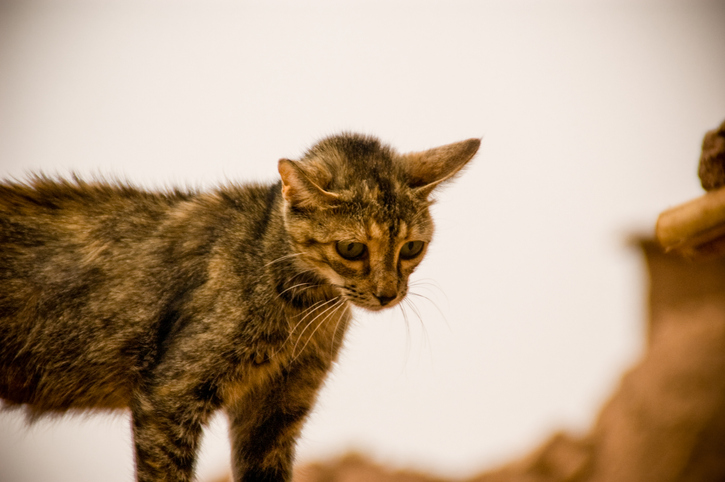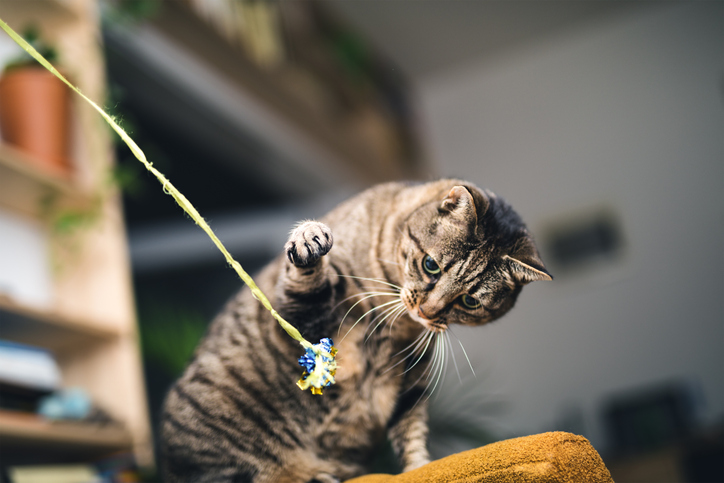Diabetes in cats can be life threatening if not treated correctly. Luckily, the disease only affects 1% of the feline population. Even though the odds of developing diabetes is rare, pet owners should be aware of the symptoms to watch out for.
Signs and Symptoms of Feline Diabetes
Some cats will show serious enough symptoms that their pet owner immediately realizes something is off. Others may have such minor symptoms that the owner doesn’t realize there is a problem.
Common symptoms of feline diabetes include:
Excessive thirst- If your cat is drinking more water, it could be a sign of diabetes. This is often the first thing pet owners recognize.
Frequent urination- If the litter box contains more wet spots than usual, it could be a sign of diabetes. Some of the new types of litters are designed to alert you to a health problem through urine staining. If you suspect a problem, it might be worth investing in such a product.
Unexplained weight loss- If your pet is eating normally, but you notice weight loss, you would notify your vet and arrange testing. Unexplained weight loss in pets can be caused by a number of different ailment.
Change in feeding patterns- If your cat seems hungry all the time or starts looking for food in garbage cans or another pet’s feed dish, you should contact your veterinarian to diagnose the feeding problem.
Lethargy and weakness- If your normally active cat suddenly becomes lethargic or seems unable to jump or run, you should immediately call your vet.

Why Some Cats Develop Feline Diabetes
While feline diabetes can appear in any cat, there are certain factors that make some cats more susceptible to the disease. Some of these are unavoidable, but some things like obesity, food quality, and medications can be controlled by communication with your vet.
Obesity- Like humans, cats who suffer from obesity and inactivity are more likely to develop diabetes, particularly later in life.
Age- The chance of kittens developing feline diabetes is much rarer than older, adult cats from suffering from the disease. This is primarily because kittens are much more active. Another reason is because the organs in a kitten are fully operational at birth, or should be. As cats age, if they have been fed the wrong food or too much food, organ damage starts to occur.
Male Hormones- Male cats are more likely to develop feline diabetes because of the buildup of testosterone in the body. Neutering a male cat does increase the likelihood that he will develop diabetes. Altered male cats are almost twice as likely to develop diabetes as unaltered males. However, as stated before the risk of developing diabetes is still low. Neutering your cat is still recommended to eliminate the risk of testicular cancer, stop unwanted behaviors such as spraying or marking, and lowers the risk of your cat developing prostate problems in the future.
Steroids- Certain medications containing steroids can increase the odds of feline diabetes in cats. Often, these medications are prescribed for asthma, allergies, inflammation and pain, and certain cancers. All of these drugs affect the pancreas, which controls blood sugar distribution throughout the body.
Food- Some bargain brands of cat food can be high in carbohydrates. Rather than providing the body with healthy fuel that feeds the organs and muscles, excess carbohydrates are converted to excess fat. This leads to obesity, which is one of the most common causes of feline diabetes.
Treating Feline Diabetes
Cats with diabetes can lead normal, healthy lives with proper treatment. Your veterinarian will diagnose the disease and make decisions about the best course of treatment for your pet. The diabetes might be able to be controlled with diet and exercise, or it might require daily insulin injections.
Healthy Food- Many high quality pet food manufacturers offer food specifically formulated for animals with diabetes. This food will often be labeled DM for diabetes management, low carb, or senior recipe. Even though these foods will help with treatment of the disease, they should not be used in place of veterinary care. When your vet develops your pet’s treatment plan, he will prescribe the best food and create a feeding schedule.
Lifestyle changes- While older cats will naturally move to a more sedentary lifestyle, one of the best ways to avoid diabetes is by activity. Encourage your cat to play more, use treats to encourage movement, and place food and water dishes so they require your cat to be active to reach them.
Insulin Injections- The prospect of giving your pet insulin injections can be scary, but the process is not difficult. Your veterinarian will show you how to measure the correct dosage and inject the medication. The dosage and its ability to control the glucose levels will be monitored through a blood-testing glucose monitor.

What Should You Do if you Think Your Pet has Diabetes?
If you notice your cat displaying any of the signs and symptoms listed above, start watching carefully and recording changes in behavior and feeding habits. Contact your vet to schedule testing and consultation.
Things to tell the vet include:
-Times and amounts off food you offer
-The brand of food you have been using
-The amount of water your pet drinks daily (use a measuring cup)
-Changes in behavior, sleep habits, movement issues
-Rapid weight gain or weight loss
-Follow the treatment plan exactly:
-Feed the prescribed brand and amount
-Record any changes you notice (improvements or problems)
-Administer medication exactly as prescribed. This includes oral medication and injections. If you are having problems or need additional help, call the office. The staff will be more than happy to help you measure the insulin and give the shots.
Final Thoughts
Your cat might develop diabetes, even though the chance is rare. Don’t be scared. The disease is controllable with medication and dietary changes. Your veterinarian is trained to develop an individualized treatment plan for your pet based on blood test results, age, and weight. You should follow this plan exactly as it is prescribed. Discuss any concerns or fears you have with your veterinarian. It is a good idea to write down your questions as they occur, in the same notebook you record the data the vet asks for.
If you have any questions or would like to schedule an appointment, call us at (817) 421-5850. Here at Creekside Pet Care Center, we would be more than happy to answer any questions you may have!





